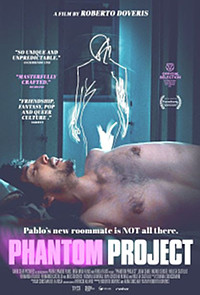| SHADOWS ON THE WALL | REVIEWS | NEWS | FESTIVAL | AWARDS | Q&A | ABOUT | TALKBACK | |||||||||||||||||||||
 Shadows off the beaten path Shadows off the beaten pathIndies, foreign, docs and shorts...
On this page:
PADRE PIO |
PHANTOM PROJECT |
WOLF AND DOG
| |||||||||||||||||||||
| See also: SHADOWS FILM FESTIVAL | Last update 5.Oct.22 | |||||||||||||||||||||
|
Padre Pio Review by Rich Cline | 
| |||||||||||||||||||||
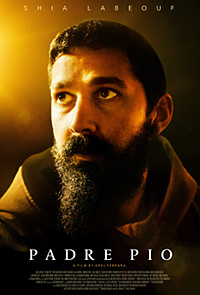 dir Abel Ferrara scr Maurizio Braucci, Abel Ferrara prd Diana Phillips, Philipp Kreuzer with Shia LaBeouf, Cristina Chiriac, Marco Leonardi, Asia Argento, Vincenzo Crea, Luca Lionello, Salvatore Ruocco, Brando Pacitto, Stella Mastrantonio, Federico Majorana, Michelangelo Dalisi, Martina Gatti release It Sep.22 vff 22/Italy 1h44  Is it streaming? |
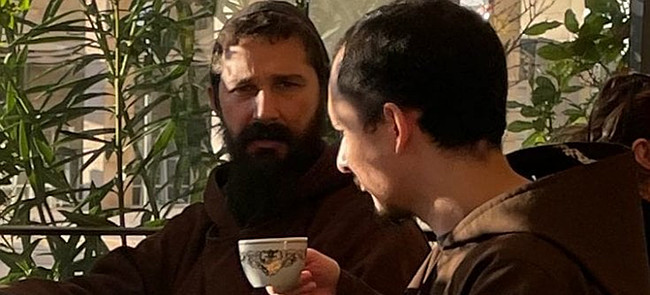 Shot in striking locations under the glaring sun, while delving into a pious man's tortured visions, this certainly isn't your usual biopic about a saint. But then it's from rebel filmmaker Abel Ferrara. It overflows with big themes and fascinating people, so the textured, naturalistic performances add weight. But the subdued pace and anecdotal structure are tricky to engage with, and the historical setting is more interesting than the plot. As surviving soldiers return to the town of San Giovani Rotondo from the Great War, radicals like Luigi (Crea) rouse the public over the pointlessness of war and the injustice in a system that punishes the poor. At the local monastery, Pio (LaBeouf) is wracked with guilt, railing against private demons while seeking peace by helping villagers, often in ways that seem miraculous. He refuses to play the role the rich and powerful want for him, working into a spiritual frenzy. The question is what officials will do on election day to remain in power. Ferrara takes an almost documentary approach to village life, capturing everyday incidents from funerals to street rallies in a skilfully offhanded way that's fascinating. By contrast, interior scenes feel archly shot in candlelight that glows red, illuminating religious mania and political rants. Much of the film centres on the political situation, as land owners react angrily that their employees are demanding be paid fairly and have been given a vote in the coming election. Their crack down is vicious. As Pio, LaBeouf gives a wrenching performance so internalised that it barely lets the audience in, especially in some enormous emotional moments. With the eyes of a true believer, he kind of floats around the edges of the film, pondering and occasionally commenting on what's happening around him. But he remains out of reach. Much more bracingly real is the range of finely played surrounding characters, each with his or her own bristling personality, agenda and perspective. The problem is that we never get to know anyone, including Pio, well enough to sympathise with them. Big ideas about war and nature are woven into the script in both philosophical speeches and Pio's running voiceover monolog, in which he questions his own role in society. This was certainly a momentous moment in Italian history, as it led directly to the rise of Mussolini, whom Pio originally supported but later renounced. But while Ferrara's approach is visually and stylistically riveting, his ponderous storytelling never comes together into anything particularly meaningful.
| ||||||||||||||||||||
|
Phantom Project Proyecto Fantasma Review by Rich Cline | 
Is it streaming?
| 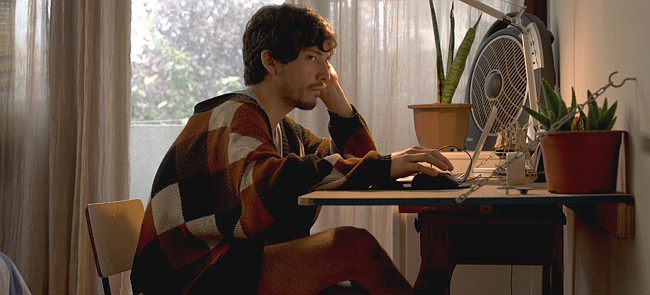 Snappy and loose, this deconstructed Chilean comedy has a fresh, funny improvisational tone. Writer-director Roberto Doveris deploys a continual stream of random characters and story threads, so it can be tricky to grab hold of the narrative. But the young guy at the centre has a hapless likeability that wins us over. And as the plot meanders amiably, it finds moments of insight that continually catch us by surprise. While struggling to make it as an actor, Pablo (Cano) plays patients for trainee doctors. And now his boyfriend has moved out, both doubling his rent and leaving him to care for their little dog Susan. Then odd things start happening, and Pablo's influencer friends decide that he must be living with a ghost who has something amorous in mind. Indeed, one night Pablo has a sexy encounter with it. Then as he hangs out around his friends and looks for a new flatmate, he decides to be a little pickier about where he auditions. Ghostly apparitions are rendered with extremely clever line animation and subtle effects that allow this intriguingly imprecise spirit to become a curious, silent character in the narrative. Pablo's social circle is made up of musicians and YouTubers who make witty observations and provide help when he needs it. As the plot gently pushes Pablo along, he has an impact on and is provoked by all kinds of people. And through it all, this invisible presence keeps him company. Cano has a wonderfully offhanded charm as Pablo, a gentle soul who just wants to live his authentic life, but because he's distracted by the need to survive, he's struggling to work out both who he is and what he needs to do. It's easy to see why he has such a large variety of people who enjoy spending time with him. They all remain marginal characters in this film, with their own stories happening off-screen. There aren't any momentous events that push Pablo along, but the way he quietly engages with everyone he meets is unusually involving. Exploring the nature of dreams and inspiration, filmmaker Doveris' ethereal touch will especially connect with creative audience members. As he tries to navigate a way through this series of challenges, Pablo realises that he needs to set priorities and limits. He also affirms that his heart is in making movies, so he sets out to land a role in a film. Perhaps all great actors are haunted by the people they have encountered in their lives.
|
| Wolf and Dog Lobo e Cão Review by Rich Cline | 
 Is it streaming?
| 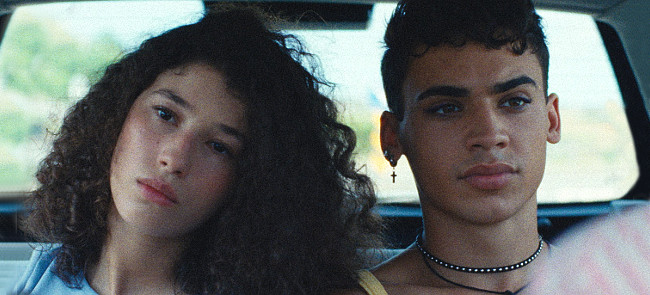 Set in the Azores archipelago, this strikingly visual slice of life is artfully shot by cinematographer Rui Xavier. Writer-director Claudia Varejao tells the story in a way that feels almost accidental, capturing tiny moments that accumulate along the way. The narrative feels meandering and elusive, with only a few sharply pointed events, but this provides the space for us to put ourselves into the situations and consider our reactions. Born in the small mid-Atlantic island of Sao Miguel, Ana (Cabral) is rebelling against the limits of her gender. She loves hanging out with her unapologetically gay pal Luis (Pimenta) and their lively group of queer friends. Then her free-spirited friend Chloe (Branquinho) visits from Canada, working alongside her in the family fruit importing business by day and visiting the clubs by night. But most people in this community also have secrets, and Ana's older brother Telmo (Tavares) is mixed up with smugglers who are bringing contraband to the island under cover of darkness. Scenes bristle with a wonderful range of family members, classmates, work colleagues and neighbours, all of whom are intimately involved in each others' lives. Ana was raised by her mother (Cordeiro) and grandmother (Alves), alongside Telmo and younger brother Simao (Ferreira), who are given much more freedom than she is. The community's intense religious traditions are also on show, whether in festival rituals or the casual comments and criticisms people drop into conversation. At one point, Telmo and Luis are sent on a men-only pilgrimage. Performances are almost startlingly offhanded, as the camera largely just observes characters in everyday situations in a variety of real-world settings. So there isn't a moment when anyone seems to be acting. That said, everything is viewed through Ana's intrigued eyes, which adds unexpected layers of interest. Cabral reveals her big feelings in skilfully understated ways. Her connection with Branquinho's relaxed Chloe is intense and full of mutual yearning. And Pimenta gives Luis a gorgeous mix of confidence and vulnerability. Varejao turns this collection of loosely connected events into a striking celebration of youthful curiosity and exploration. It's a story about embracing the need to find independence from both family and culture in order to work out who you really are. No one feels free if they're forbidden from expressing themselves honestly, so it feels almost miraculous that a vibrant, resilient, supportive LGBTQ community has sprung up even in this intolerant and isolated place. Perhaps there might be hope even if you don't manage to escape.
| 
See also: SHADOWS FILM FESTIVAL © 2022 by Rich Cline, Shadows
on the Wall
HOME | REVIEWS | NEWS | FESTIVAL | AWARDS
| Q&A | ABOUT | TALKBACK | | |||||||||||||||

